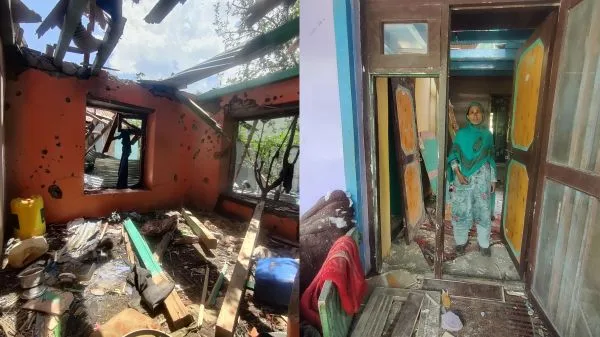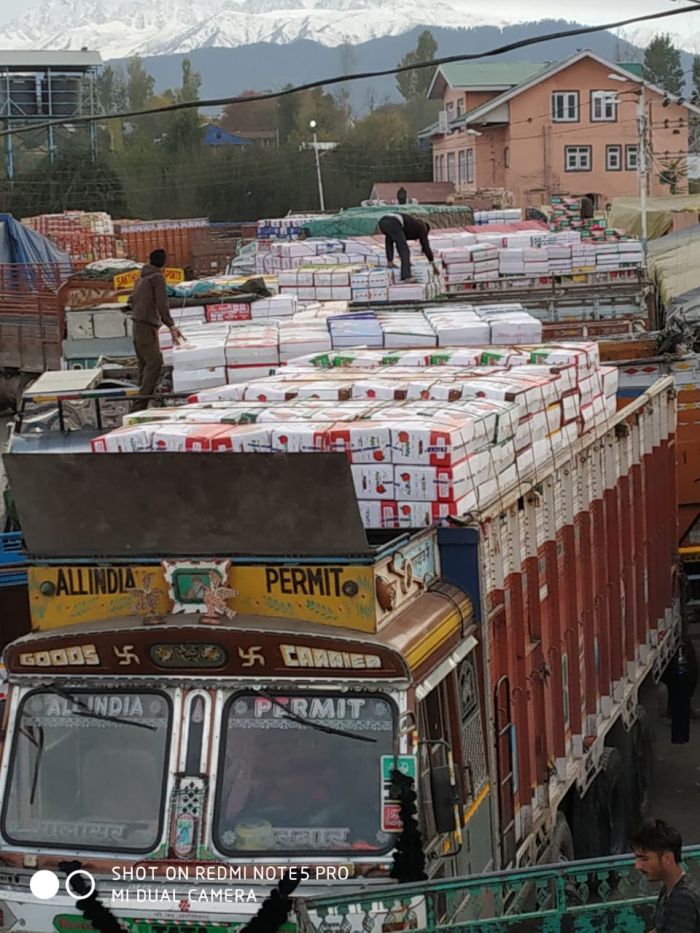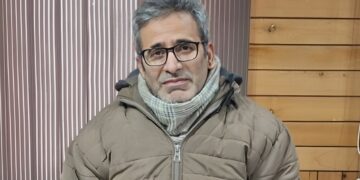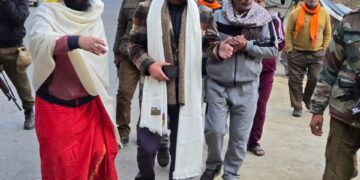Soki Dani, Uri: Mother of eight children, Nisar Fatima, a resident of Soki Dani Basgrah in Uri, returned home after taking shelter at a rehabilitation centre in Sheeri, only to find her house reduced to rubble.
A massive bombshell, reportedly fired from across the border in Pakistan, had struck her home during the recent cross-border shelling.
“I have eight children — where will I go now?” Fatima cried, standing amidst the debris of her once-standing home. “We left to save our lives and sought refuge in Sheeri, but when I came back, my house was gone. I came back to see nothing — no roof, no belongings, not even clothes for my kids,” she said, showing a water pot damaged by shell splinters.
“Dozens of shells rained down on our village, and mine was completely destroyed. Even our clothes, kitchen utensils — everything is lost,” she added.
Her husband, who is physically challenged, was also evacuated during the shelling. The family is now left with nothing but uncertainty and trauma as they await help.
Like Fatima, dozens of families have returned to their villages in Uri, Gurez, and Keran after days of intense shelling that forced them to flee. Although the guns have fallen silent under the new ceasefire agreement between India and Pakistan, comfort remains elusive. Many residents have found their homes flattened and their villages scarred by unexploded ordnance — deadly remnants of the violence.
“We don’t want to die every day,” said Nasir Ali from Kalgie Salamabad Uri, surveying the ruins of his ancestral home. “Either keep the ceasefire agreement or end it all. I came back just to see the damage — it’s not a place to live anymore.”
For many like Nasir, the damage goes beyond bricks and mortar. “What will my parents think when they see the house in this condition? They built it with years of sacrifice. It feels impossible to rebuild,” he sobbed.
Zubaida Begum, another displaced resident, recalled three terrifying days spent huddled with her four children in a single room. “The sounds of shelling were horrific,” she said, her voice breaking. Her husband was away for work, and she had to face the shelling alone.
Eventually, she took refuge in a house nearby and later managed to flee during the night amid shelling. “After that deadly night, we boarded an evacuation bus. We’re now staying at Mountain Valley Educational Institutions in Sheeri,” she said, pleading to return home but being stopped by security restrictions. “All my belongings and animals are there. But the police won’t allow me. I just want to see if my house is still standing.”
Authorities say their concerns are valid. Unexploded shells pose serious risks. Entire villages remain unsafe despite the ceasefire.
Sharafat Hussain from Gingal Uri echoed this helplessness. “I came back with my brother. We’re just collecting the debris,” he said. “Our wives and children are still at the shelter. What will they see when they return?”
Sharafat’s two-and-a-half-year-old daughter suffered the worst — terrified and unable to understand why loud bangs had upended her life. “We stuffed cotton in her ears. She still cries.”
Twenty-five families fled Syed Mohalla Gingal on May 8. Only ten have returned briefly, only to find what once were homes now reduced to rubble.
“We lost our homes, our peace, and some even their loved ones — while those sitting comfortably in TV studios fuel hatred and call it patriotism. Let them spend a night under fire like we did,” said Sharafat Hussain, a resident of Uri.
“Ceasefire may have silenced the guns, but the damage done by warmongering voices in newsrooms will take longer to heal. They don’t see the tears in our children’s eyes or the rubble that was once our homes,” said Zubaida Begum, a displaced mother of four.
In Razarwani village, tragedy struck harder. Nargis Begum, a 40-year-old school worker and mother of six, was killed as her family tried to flee under the cover of night. Their vehicle was hit by shelling around 9:00 PM. Her daughter, Sanam, 16, was preparing for her wedding.
“Please bring my mother back,” Sanam whispered, wiping away tears. “Who will help me now? How can I live without her?”
Nargis’s death shook the entire village. “We are used to shelling, but this time was unprecedented,” said Mohammad Shafi, a relative.
In Lagama Uri, Akhtar Parmeen recounted how a shell destroyed her family’s shop. “It was horrific. We huddled in one room and prayed we’d survive.” Her husband, Sakhi Mohammad, fled with their six children and is now sheltered in Boniyar.
Further along the LoC, Halima Begum in Esham clutched her six-month-old grandchild when the shelling started. “We lay on the floor, trying to shield her. I didn’t sleep for three days,” she said, now preparing to go to Chandanwari for safety.
Her daughter-in-law Ishrat added, “We left everything — our animals, our relatives. My daughter Ayat just wanted to go to school. She screamed, ‘Bachao!’ every time a shell landed.”
For Masrat from Bandi Uri, the anxiety remains. “My children haven’t eaten properly in days. When a shell landed near our home on May 9, we knew we had to leave. This time it felt like death was closing in.”
Packing only essentials, she fled, hoping peace would return. “Only peace can give us relief,” she said. “Please, stop this madness. Let us live in peace.”
In Uri, thousands were displaced by shelling that claimed 22 lives and injured 19 others. Entire villages were evacuated, and homes, schools, and places of worship were reduced to ashes.
Six villages have now been cleared and deemed safe. Local MLA Sajad Shafi thanked the Baramulla district administration and residents for sheltering the displaced, including help from the Gurudwara committees.
Manzoor Ahmad, one of the returnees, said, “Our homes are destroyed, but we just want peace.” Zakir Malik from Gingal returned with his family of seven. “We came back to feed cattle and work in our fields. There’s hope in that,” he said.
Yet many still remain in makeshift shelters — schools, seminaries, and colleges — waiting for clearance to go home.
At Baramulla’s women’s college shelter, where over 600 are housed, emotions ran high as the ceasefire was announced. “It’s a ray of hope,” said Nasir Hussain of Kamalkote. “We thought we would never return.”
Still, past ceasefires have failed. “But something about this one feels different,” said Feroz Ahmad, another Uri resident. “Maybe because both countries came so close to war.”
Zahoor Ahmad Pathan, who spent four nights in the basement of a mosque, is finally preparing meals again. “I will now bring my family home,” he said.
Tahira, a high school student at Darul-uloom Sheeri, still hears the loud bangs of May 6 and 7 in her mind. “But I believe I’ll return home and go to school again.”
Shahjahana, displaced with her daughters, broke down. “We’ve endured destruction and bombardment. But the ceasefire gives us hope. Maybe our happiness can return.”
“We are peace lovers,” said Tahir Ahmad, another resident of Uri. “But we always suffer first. We appeal to both countries — engage in meaningful dialogue. Stop this once and for all.”







